A Systematic Review: Adolescent Obesity and Mental Health in Australia
VerifiedAdded on 2023/06/07
|10
|2044
|364
Literature Review
AI Summary
This assignment presents a systematic review of the literature on adolescent obesity in Australia, investigating the relationship between obesity and mental health, and evaluating the effectiveness of community-based prevention interventions. The review identifies a positive correlation between obesity and poor mental well-being in adolescents and highlights the need for collaborative efforts between obesity practitioners and mental health professionals. It emphasizes the importance of addressing risk factors such as gender, socio-economic status, and education level in intervention strategies. The review concludes that while community-based obesity prevention interventions show promise, they often lack explicit mental health components. Future research should integrate mental well-being measures to better understand the mechanisms affecting weight-related problems in adolescents and to promote healthy lifestyle practices in Australia. Desklib provides access to this and other solved assignments.
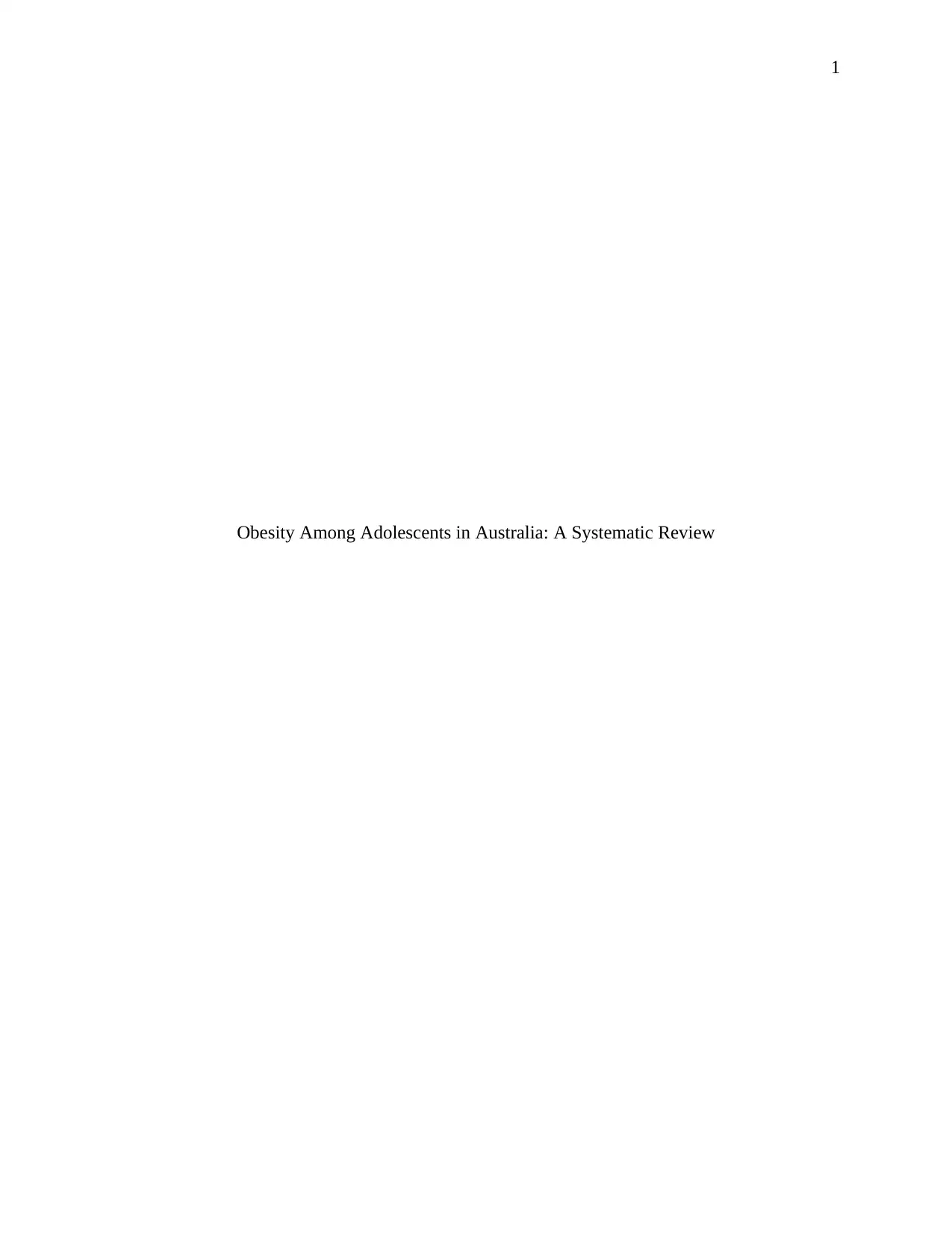
1
Obesity Among Adolescents in Australia: A Systematic Review
Obesity Among Adolescents in Australia: A Systematic Review
Paraphrase This Document
Need a fresh take? Get an instant paraphrase of this document with our AI Paraphraser
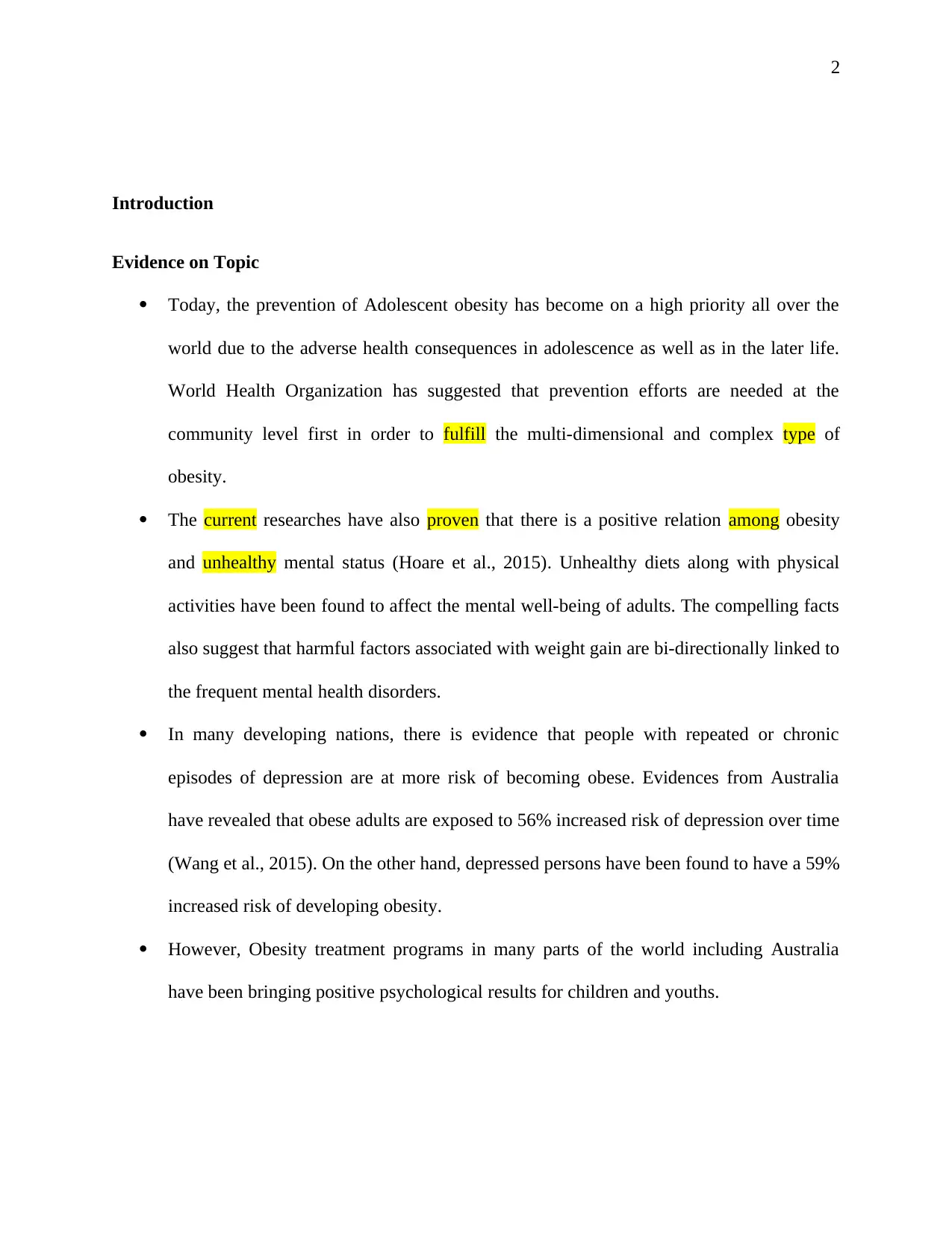
2
Introduction
Evidence on Topic
Today, the prevention of Adolescent obesity has become on a high priority all over the
world due to the adverse health consequences in adolescence as well as in the later life.
World Health Organization has suggested that prevention efforts are needed at the
community level first in order to fulfill the multi-dimensional and complex type of
obesity.
The current researches have also proven that there is a positive relation among obesity
and unhealthy mental status (Hoare et al., 2015). Unhealthy diets along with physical
activities have been found to affect the mental well-being of adults. The compelling facts
also suggest that harmful factors associated with weight gain are bi-directionally linked to
the frequent mental health disorders.
In many developing nations, there is evidence that people with repeated or chronic
episodes of depression are at more risk of becoming obese. Evidences from Australia
have revealed that obese adults are exposed to 56% increased risk of depression over time
(Wang et al., 2015). On the other hand, depressed persons have been found to have a 59%
increased risk of developing obesity.
However, Obesity treatment programs in many parts of the world including Australia
have been bringing positive psychological results for children and youths.
Introduction
Evidence on Topic
Today, the prevention of Adolescent obesity has become on a high priority all over the
world due to the adverse health consequences in adolescence as well as in the later life.
World Health Organization has suggested that prevention efforts are needed at the
community level first in order to fulfill the multi-dimensional and complex type of
obesity.
The current researches have also proven that there is a positive relation among obesity
and unhealthy mental status (Hoare et al., 2015). Unhealthy diets along with physical
activities have been found to affect the mental well-being of adults. The compelling facts
also suggest that harmful factors associated with weight gain are bi-directionally linked to
the frequent mental health disorders.
In many developing nations, there is evidence that people with repeated or chronic
episodes of depression are at more risk of becoming obese. Evidences from Australia
have revealed that obese adults are exposed to 56% increased risk of depression over time
(Wang et al., 2015). On the other hand, depressed persons have been found to have a 59%
increased risk of developing obesity.
However, Obesity treatment programs in many parts of the world including Australia
have been bringing positive psychological results for children and youths.
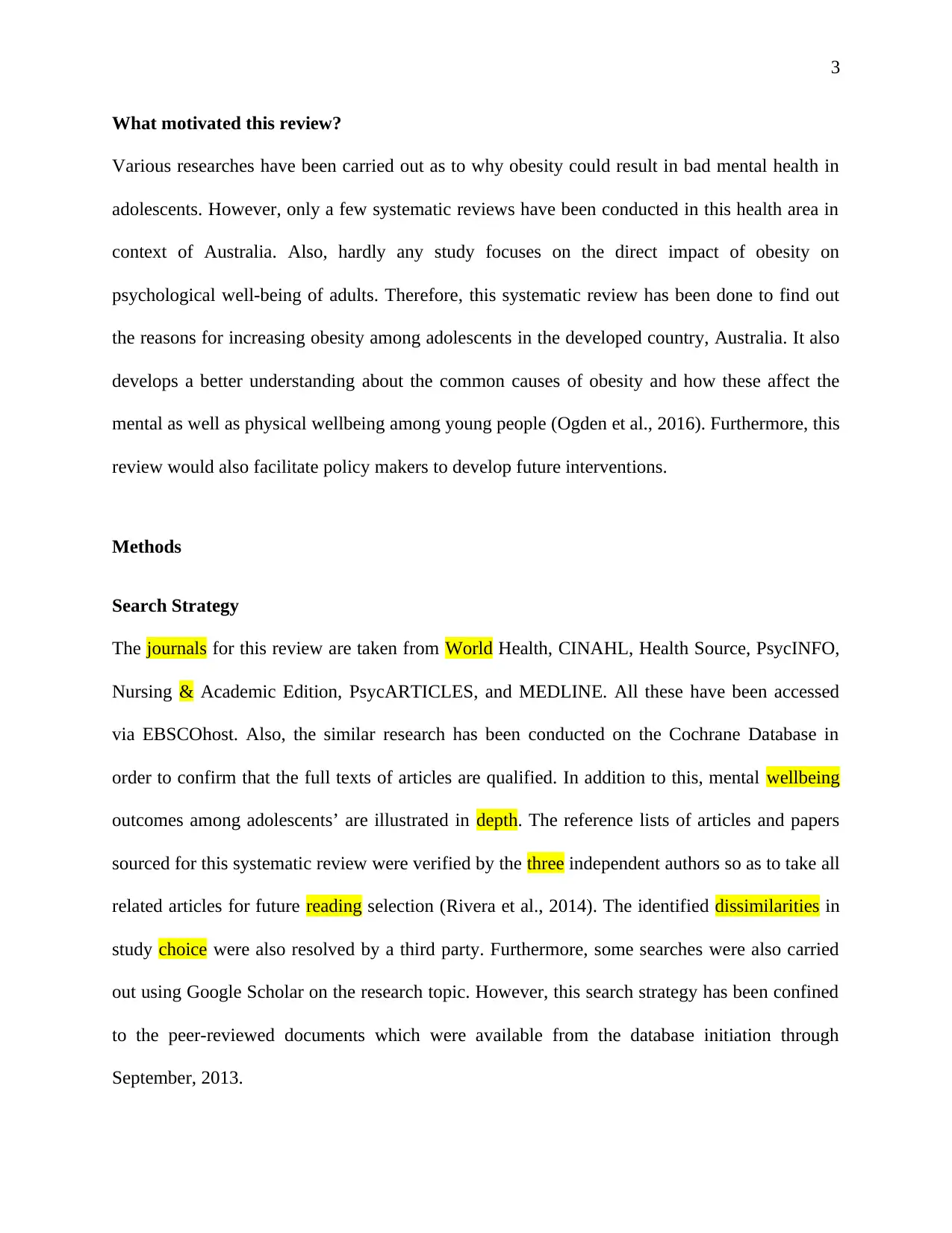
3
What motivated this review?
Various researches have been carried out as to why obesity could result in bad mental health in
adolescents. However, only a few systematic reviews have been conducted in this health area in
context of Australia. Also, hardly any study focuses on the direct impact of obesity on
psychological well-being of adults. Therefore, this systematic review has been done to find out
the reasons for increasing obesity among adolescents in the developed country, Australia. It also
develops a better understanding about the common causes of obesity and how these affect the
mental as well as physical wellbeing among young people (Ogden et al., 2016). Furthermore, this
review would also facilitate policy makers to develop future interventions.
Methods
Search Strategy
The journals for this review are taken from World Health, CINAHL, Health Source, PsycINFO,
Nursing & Academic Edition, PsycARTICLES, and MEDLINE. All these have been accessed
via EBSCOhost. Also, the similar research has been conducted on the Cochrane Database in
order to confirm that the full texts of articles are qualified. In addition to this, mental wellbeing
outcomes among adolescents’ are illustrated in depth. The reference lists of articles and papers
sourced for this systematic review were verified by the three independent authors so as to take all
related articles for future reading selection (Rivera et al., 2014). The identified dissimilarities in
study choice were also resolved by a third party. Furthermore, some searches were also carried
out using Google Scholar on the research topic. However, this search strategy has been confined
to the peer-reviewed documents which were available from the database initiation through
September, 2013.
What motivated this review?
Various researches have been carried out as to why obesity could result in bad mental health in
adolescents. However, only a few systematic reviews have been conducted in this health area in
context of Australia. Also, hardly any study focuses on the direct impact of obesity on
psychological well-being of adults. Therefore, this systematic review has been done to find out
the reasons for increasing obesity among adolescents in the developed country, Australia. It also
develops a better understanding about the common causes of obesity and how these affect the
mental as well as physical wellbeing among young people (Ogden et al., 2016). Furthermore, this
review would also facilitate policy makers to develop future interventions.
Methods
Search Strategy
The journals for this review are taken from World Health, CINAHL, Health Source, PsycINFO,
Nursing & Academic Edition, PsycARTICLES, and MEDLINE. All these have been accessed
via EBSCOhost. Also, the similar research has been conducted on the Cochrane Database in
order to confirm that the full texts of articles are qualified. In addition to this, mental wellbeing
outcomes among adolescents’ are illustrated in depth. The reference lists of articles and papers
sourced for this systematic review were verified by the three independent authors so as to take all
related articles for future reading selection (Rivera et al., 2014). The identified dissimilarities in
study choice were also resolved by a third party. Furthermore, some searches were also carried
out using Google Scholar on the research topic. However, this search strategy has been confined
to the peer-reviewed documents which were available from the database initiation through
September, 2013.
You're viewing a preview
Unlock full access by subscribing today!
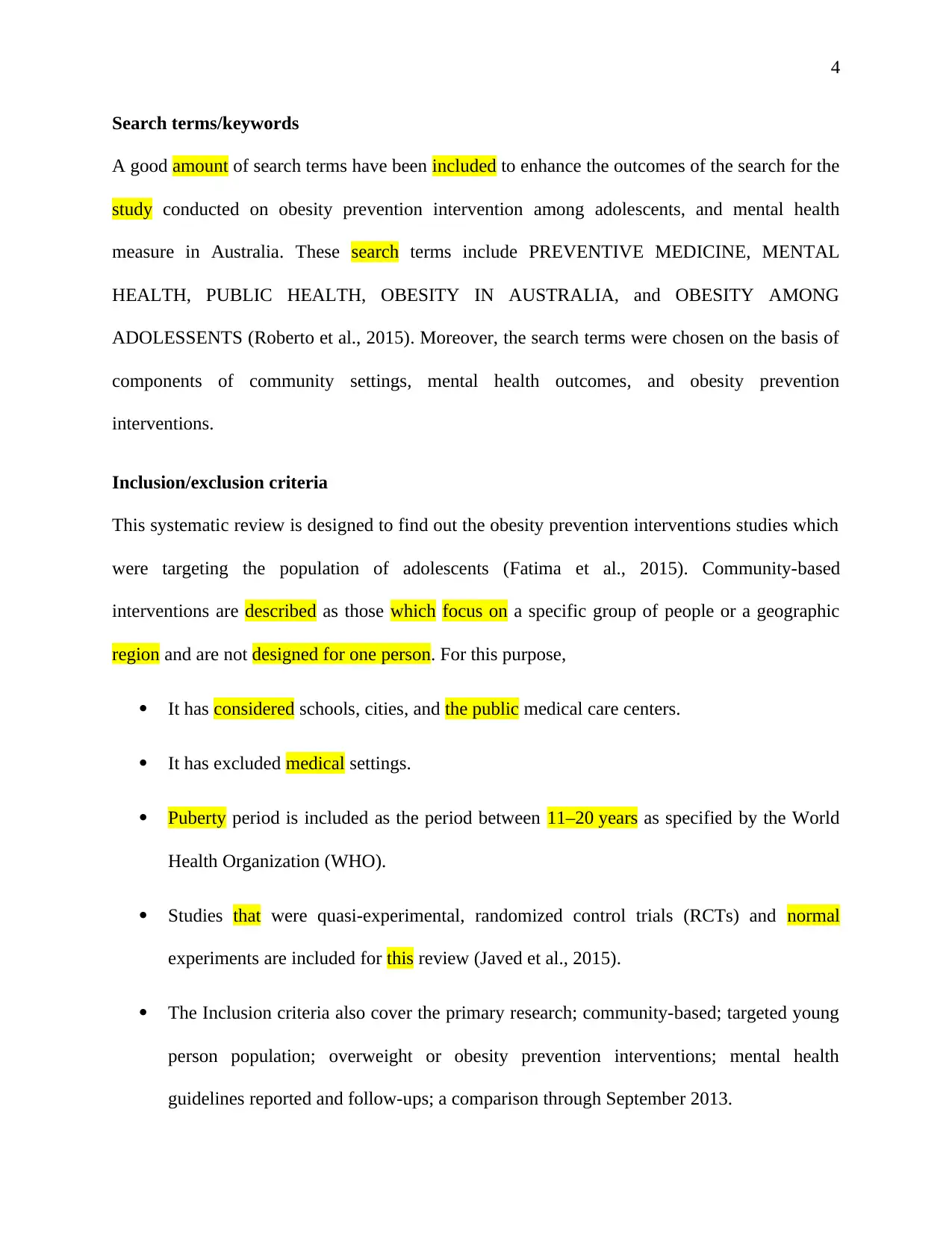
4
Search terms/keywords
A good amount of search terms have been included to enhance the outcomes of the search for the
study conducted on obesity prevention intervention among adolescents, and mental health
measure in Australia. These search terms include PREVENTIVE MEDICINE, MENTAL
HEALTH, PUBLIC HEALTH, OBESITY IN AUSTRALIA, and OBESITY AMONG
ADOLESSENTS (Roberto et al., 2015). Moreover, the search terms were chosen on the basis of
components of community settings, mental health outcomes, and obesity prevention
interventions.
Inclusion/exclusion criteria
This systematic review is designed to find out the obesity prevention interventions studies which
were targeting the population of adolescents (Fatima et al., 2015). Community-based
interventions are described as those which focus on a specific group of people or a geographic
region and are not designed for one person. For this purpose,
It has considered schools, cities, and the public medical care centers.
It has excluded medical settings.
Puberty period is included as the period between 11–20 years as specified by the World
Health Organization (WHO).
Studies that were quasi-experimental, randomized control trials (RCTs) and normal
experiments are included for this review (Javed et al., 2015).
The Inclusion criteria also cover the primary research; community-based; targeted young
person population; overweight or obesity prevention interventions; mental health
guidelines reported and follow-ups; a comparison through September 2013.
Search terms/keywords
A good amount of search terms have been included to enhance the outcomes of the search for the
study conducted on obesity prevention intervention among adolescents, and mental health
measure in Australia. These search terms include PREVENTIVE MEDICINE, MENTAL
HEALTH, PUBLIC HEALTH, OBESITY IN AUSTRALIA, and OBESITY AMONG
ADOLESSENTS (Roberto et al., 2015). Moreover, the search terms were chosen on the basis of
components of community settings, mental health outcomes, and obesity prevention
interventions.
Inclusion/exclusion criteria
This systematic review is designed to find out the obesity prevention interventions studies which
were targeting the population of adolescents (Fatima et al., 2015). Community-based
interventions are described as those which focus on a specific group of people or a geographic
region and are not designed for one person. For this purpose,
It has considered schools, cities, and the public medical care centers.
It has excluded medical settings.
Puberty period is included as the period between 11–20 years as specified by the World
Health Organization (WHO).
Studies that were quasi-experimental, randomized control trials (RCTs) and normal
experiments are included for this review (Javed et al., 2015).
The Inclusion criteria also cover the primary research; community-based; targeted young
person population; overweight or obesity prevention interventions; mental health
guidelines reported and follow-ups; a comparison through September 2013.
Paraphrase This Document
Need a fresh take? Get an instant paraphrase of this document with our AI Paraphraser
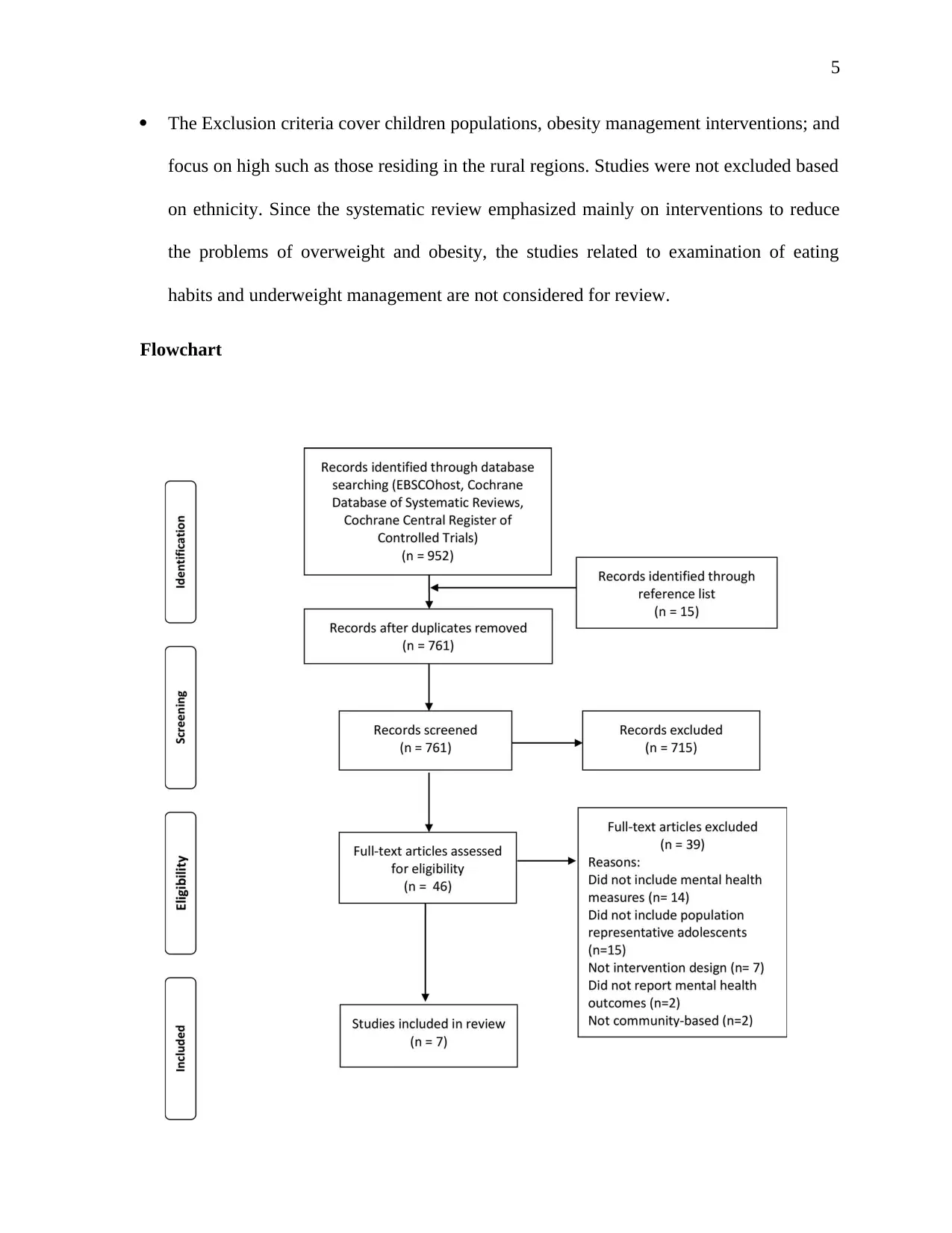
5
The Exclusion criteria cover children populations, obesity management interventions; and
focus on high such as those residing in the rural regions. Studies were not excluded based
on ethnicity. Since the systematic review emphasized mainly on interventions to reduce
the problems of overweight and obesity, the studies related to examination of eating
habits and underweight management are not considered for review.
Flowchart
The Exclusion criteria cover children populations, obesity management interventions; and
focus on high such as those residing in the rural regions. Studies were not excluded based
on ethnicity. Since the systematic review emphasized mainly on interventions to reduce
the problems of overweight and obesity, the studies related to examination of eating
habits and underweight management are not considered for review.
Flowchart
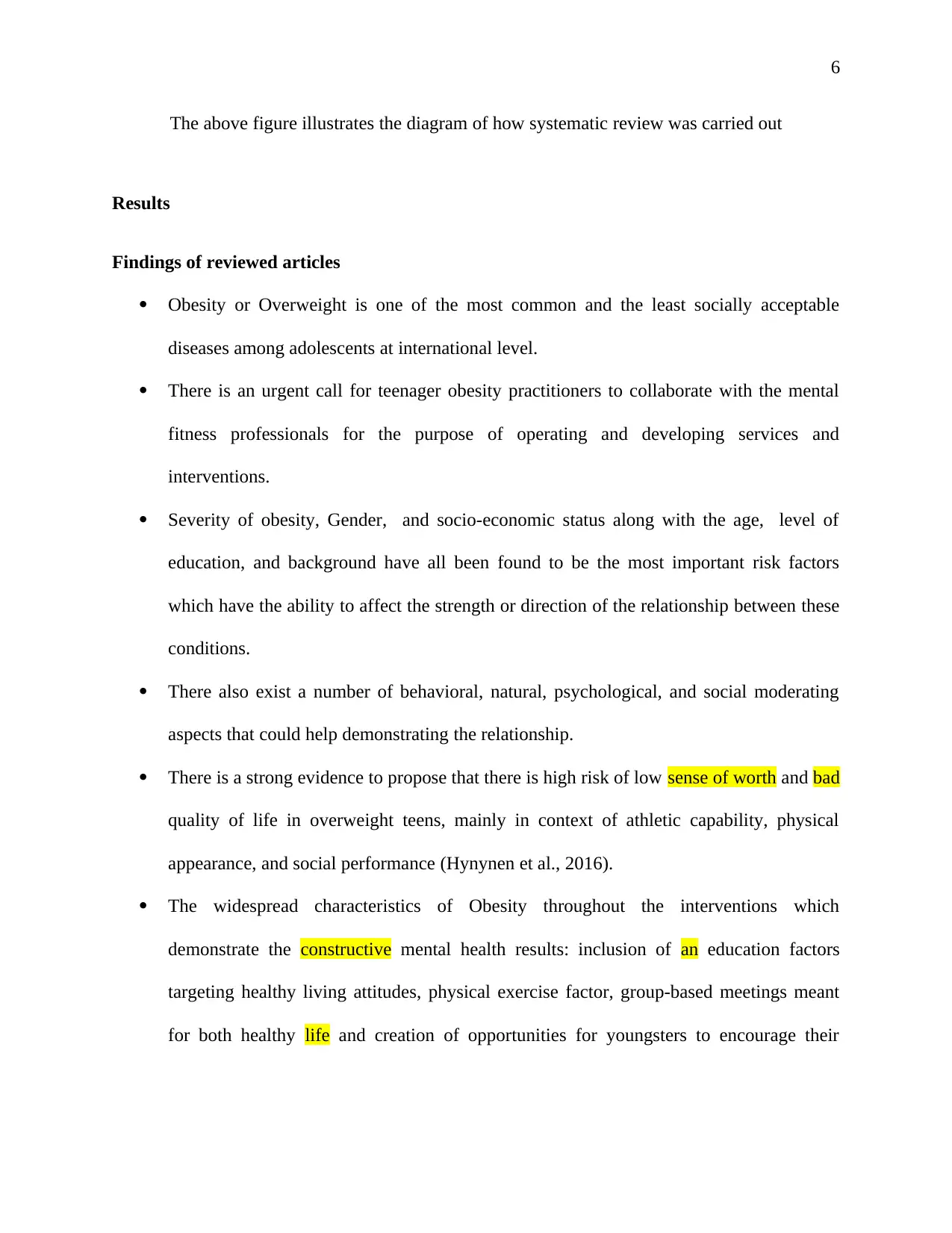
6
The above figure illustrates the diagram of how systematic review was carried out
Results
Findings of reviewed articles
Obesity or Overweight is one of the most common and the least socially acceptable
diseases among adolescents at international level.
There is an urgent call for teenager obesity practitioners to collaborate with the mental
fitness professionals for the purpose of operating and developing services and
interventions.
Severity of obesity, Gender, and socio-economic status along with the age, level of
education, and background have all been found to be the most important risk factors
which have the ability to affect the strength or direction of the relationship between these
conditions.
There also exist a number of behavioral, natural, psychological, and social moderating
aspects that could help demonstrating the relationship.
There is a strong evidence to propose that there is high risk of low sense of worth and bad
quality of life in overweight teens, mainly in context of athletic capability, physical
appearance, and social performance (Hynynen et al., 2016).
The widespread characteristics of Obesity throughout the interventions which
demonstrate the constructive mental health results: inclusion of an education factors
targeting healthy living attitudes, physical exercise factor, group-based meetings meant
for both healthy life and creation of opportunities for youngsters to encourage their
The above figure illustrates the diagram of how systematic review was carried out
Results
Findings of reviewed articles
Obesity or Overweight is one of the most common and the least socially acceptable
diseases among adolescents at international level.
There is an urgent call for teenager obesity practitioners to collaborate with the mental
fitness professionals for the purpose of operating and developing services and
interventions.
Severity of obesity, Gender, and socio-economic status along with the age, level of
education, and background have all been found to be the most important risk factors
which have the ability to affect the strength or direction of the relationship between these
conditions.
There also exist a number of behavioral, natural, psychological, and social moderating
aspects that could help demonstrating the relationship.
There is a strong evidence to propose that there is high risk of low sense of worth and bad
quality of life in overweight teens, mainly in context of athletic capability, physical
appearance, and social performance (Hynynen et al., 2016).
The widespread characteristics of Obesity throughout the interventions which
demonstrate the constructive mental health results: inclusion of an education factors
targeting healthy living attitudes, physical exercise factor, group-based meetings meant
for both healthy life and creation of opportunities for youngsters to encourage their
You're viewing a preview
Unlock full access by subscribing today!
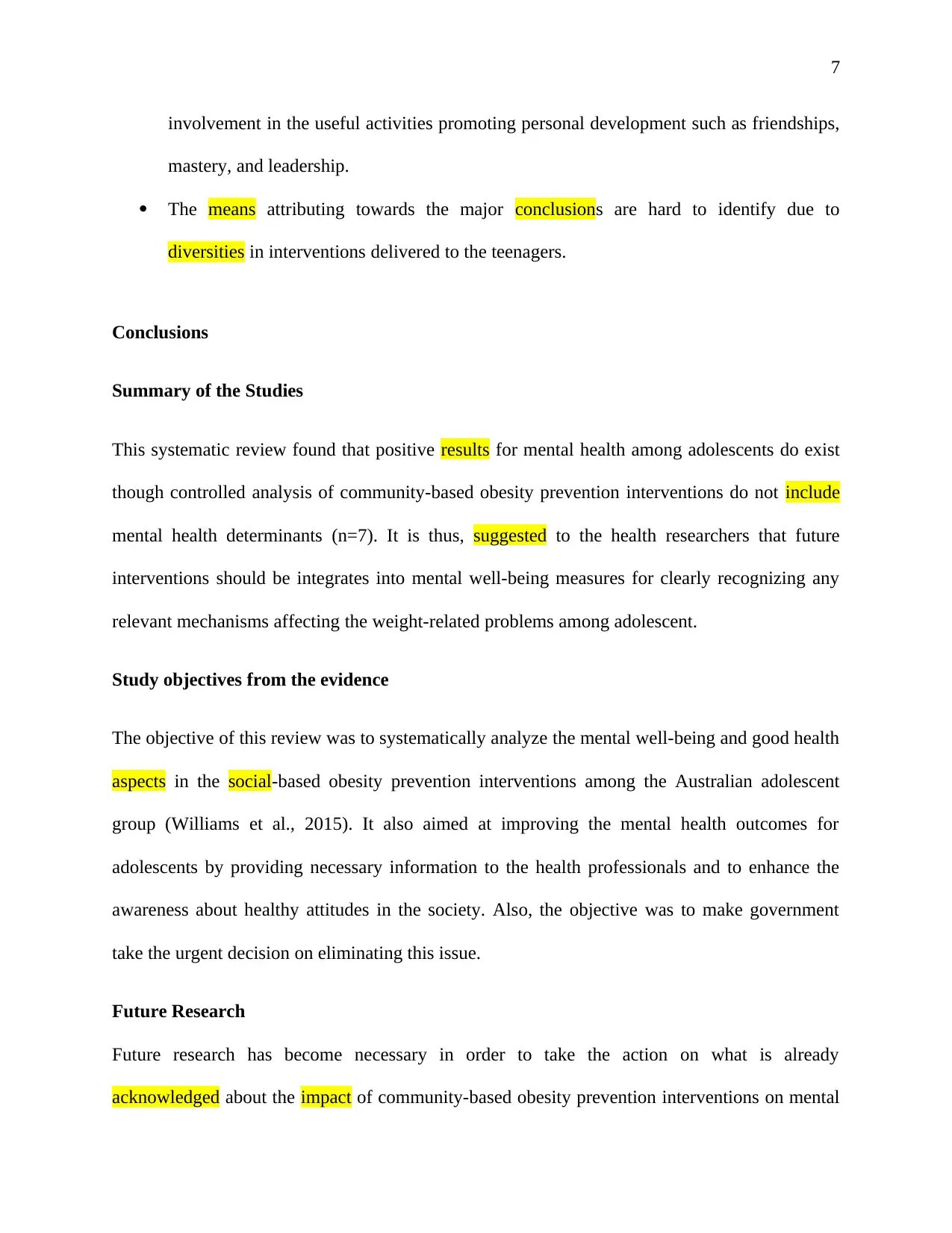
7
involvement in the useful activities promoting personal development such as friendships,
mastery, and leadership.
The means attributing towards the major conclusions are hard to identify due to
diversities in interventions delivered to the teenagers.
Conclusions
Summary of the Studies
This systematic review found that positive results for mental health among adolescents do exist
though controlled analysis of community-based obesity prevention interventions do not include
mental health determinants (n=7). It is thus, suggested to the health researchers that future
interventions should be integrates into mental well-being measures for clearly recognizing any
relevant mechanisms affecting the weight-related problems among adolescent.
Study objectives from the evidence
The objective of this review was to systematically analyze the mental well-being and good health
aspects in the social-based obesity prevention interventions among the Australian adolescent
group (Williams et al., 2015). It also aimed at improving the mental health outcomes for
adolescents by providing necessary information to the health professionals and to enhance the
awareness about healthy attitudes in the society. Also, the objective was to make government
take the urgent decision on eliminating this issue.
Future Research
Future research has become necessary in order to take the action on what is already
acknowledged about the impact of community-based obesity prevention interventions on mental
involvement in the useful activities promoting personal development such as friendships,
mastery, and leadership.
The means attributing towards the major conclusions are hard to identify due to
diversities in interventions delivered to the teenagers.
Conclusions
Summary of the Studies
This systematic review found that positive results for mental health among adolescents do exist
though controlled analysis of community-based obesity prevention interventions do not include
mental health determinants (n=7). It is thus, suggested to the health researchers that future
interventions should be integrates into mental well-being measures for clearly recognizing any
relevant mechanisms affecting the weight-related problems among adolescent.
Study objectives from the evidence
The objective of this review was to systematically analyze the mental well-being and good health
aspects in the social-based obesity prevention interventions among the Australian adolescent
group (Williams et al., 2015). It also aimed at improving the mental health outcomes for
adolescents by providing necessary information to the health professionals and to enhance the
awareness about healthy attitudes in the society. Also, the objective was to make government
take the urgent decision on eliminating this issue.
Future Research
Future research has become necessary in order to take the action on what is already
acknowledged about the impact of community-based obesity prevention interventions on mental
Paraphrase This Document
Need a fresh take? Get an instant paraphrase of this document with our AI Paraphraser
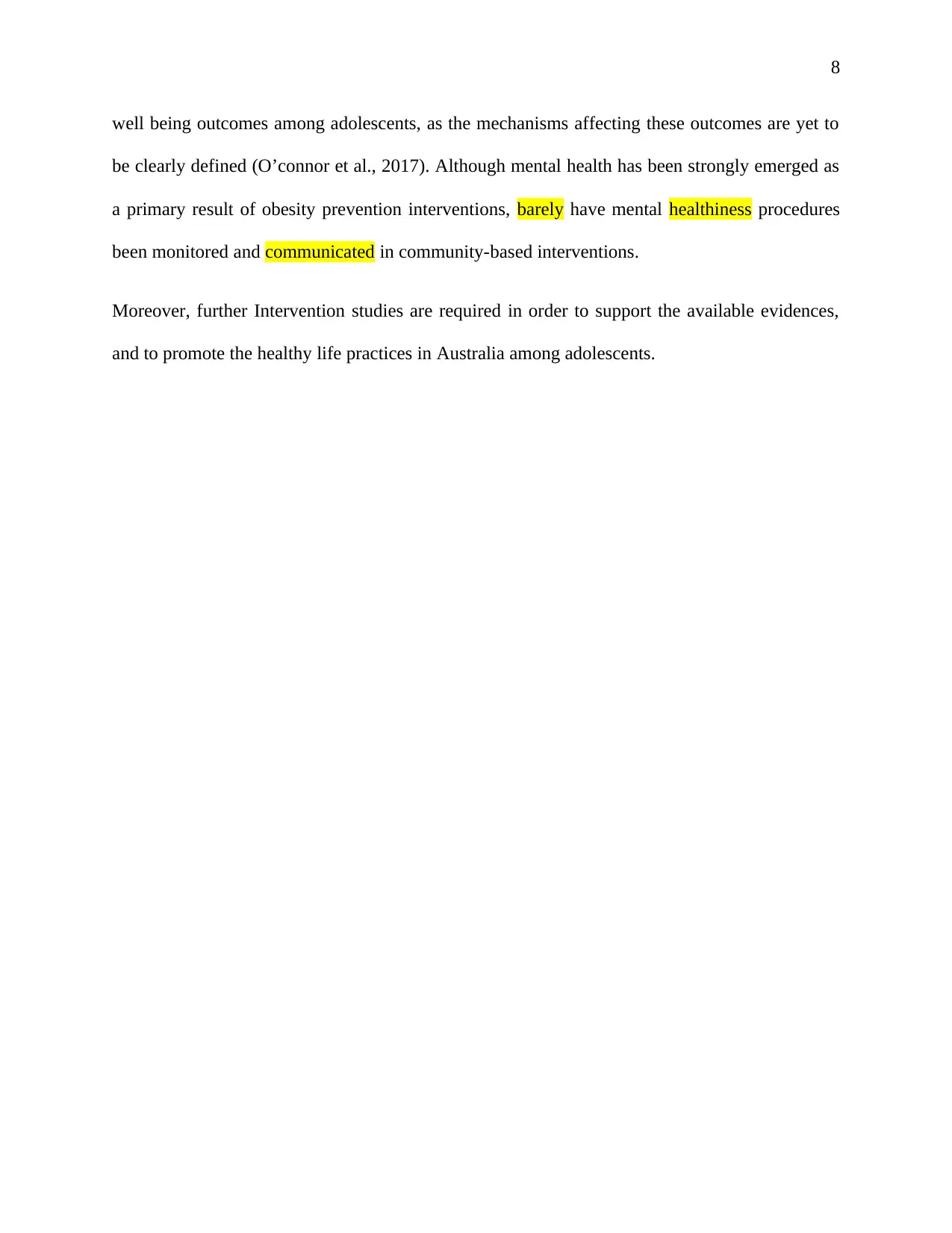
8
well being outcomes among adolescents, as the mechanisms affecting these outcomes are yet to
be clearly defined (O’connor et al., 2017). Although mental health has been strongly emerged as
a primary result of obesity prevention interventions, barely have mental healthiness procedures
been monitored and communicated in community-based interventions.
Moreover, further Intervention studies are required in order to support the available evidences,
and to promote the healthy life practices in Australia among adolescents.
well being outcomes among adolescents, as the mechanisms affecting these outcomes are yet to
be clearly defined (O’connor et al., 2017). Although mental health has been strongly emerged as
a primary result of obesity prevention interventions, barely have mental healthiness procedures
been monitored and communicated in community-based interventions.
Moreover, further Intervention studies are required in order to support the available evidences,
and to promote the healthy life practices in Australia among adolescents.
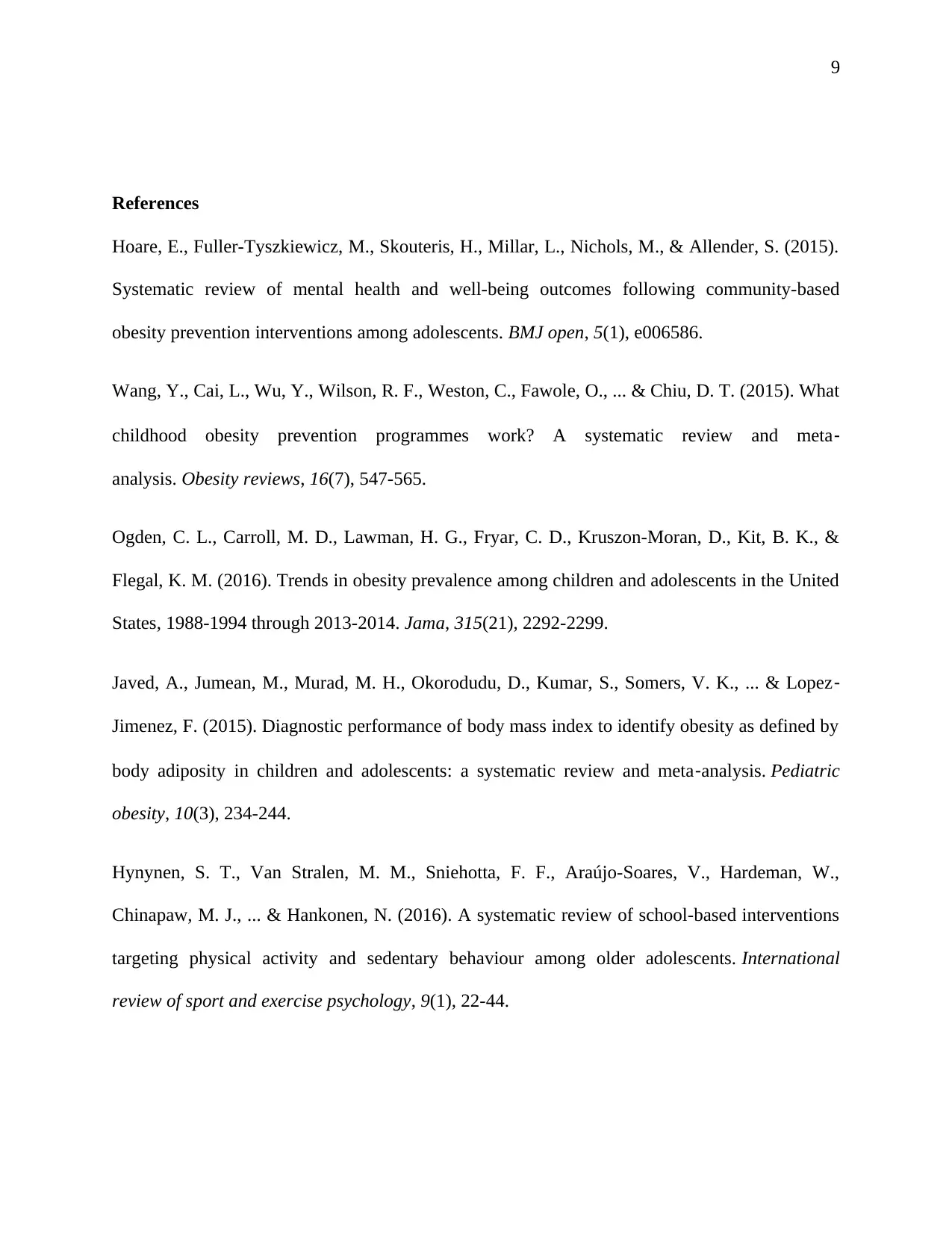
9
References
Hoare, E., Fuller-Tyszkiewicz, M., Skouteris, H., Millar, L., Nichols, M., & Allender, S. (2015).
Systematic review of mental health and well-being outcomes following community-based
obesity prevention interventions among adolescents. BMJ open, 5(1), e006586.
Wang, Y., Cai, L., Wu, Y., Wilson, R. F., Weston, C., Fawole, O., ... & Chiu, D. T. (2015). What
childhood obesity prevention programmes work? A systematic review and meta‐
analysis. Obesity reviews, 16(7), 547-565.
Ogden, C. L., Carroll, M. D., Lawman, H. G., Fryar, C. D., Kruszon-Moran, D., Kit, B. K., &
Flegal, K. M. (2016). Trends in obesity prevalence among children and adolescents in the United
States, 1988-1994 through 2013-2014. Jama, 315(21), 2292-2299.
Javed, A., Jumean, M., Murad, M. H., Okorodudu, D., Kumar, S., Somers, V. K., ... & Lopez‐
Jimenez, F. (2015). Diagnostic performance of body mass index to identify obesity as defined by
body adiposity in children and adolescents: a systematic review and meta‐analysis. Pediatric
obesity, 10(3), 234-244.
Hynynen, S. T., Van Stralen, M. M., Sniehotta, F. F., Araújo-Soares, V., Hardeman, W.,
Chinapaw, M. J., ... & Hankonen, N. (2016). A systematic review of school-based interventions
targeting physical activity and sedentary behaviour among older adolescents. International
review of sport and exercise psychology, 9(1), 22-44.
References
Hoare, E., Fuller-Tyszkiewicz, M., Skouteris, H., Millar, L., Nichols, M., & Allender, S. (2015).
Systematic review of mental health and well-being outcomes following community-based
obesity prevention interventions among adolescents. BMJ open, 5(1), e006586.
Wang, Y., Cai, L., Wu, Y., Wilson, R. F., Weston, C., Fawole, O., ... & Chiu, D. T. (2015). What
childhood obesity prevention programmes work? A systematic review and meta‐
analysis. Obesity reviews, 16(7), 547-565.
Ogden, C. L., Carroll, M. D., Lawman, H. G., Fryar, C. D., Kruszon-Moran, D., Kit, B. K., &
Flegal, K. M. (2016). Trends in obesity prevalence among children and adolescents in the United
States, 1988-1994 through 2013-2014. Jama, 315(21), 2292-2299.
Javed, A., Jumean, M., Murad, M. H., Okorodudu, D., Kumar, S., Somers, V. K., ... & Lopez‐
Jimenez, F. (2015). Diagnostic performance of body mass index to identify obesity as defined by
body adiposity in children and adolescents: a systematic review and meta‐analysis. Pediatric
obesity, 10(3), 234-244.
Hynynen, S. T., Van Stralen, M. M., Sniehotta, F. F., Araújo-Soares, V., Hardeman, W.,
Chinapaw, M. J., ... & Hankonen, N. (2016). A systematic review of school-based interventions
targeting physical activity and sedentary behaviour among older adolescents. International
review of sport and exercise psychology, 9(1), 22-44.
You're viewing a preview
Unlock full access by subscribing today!
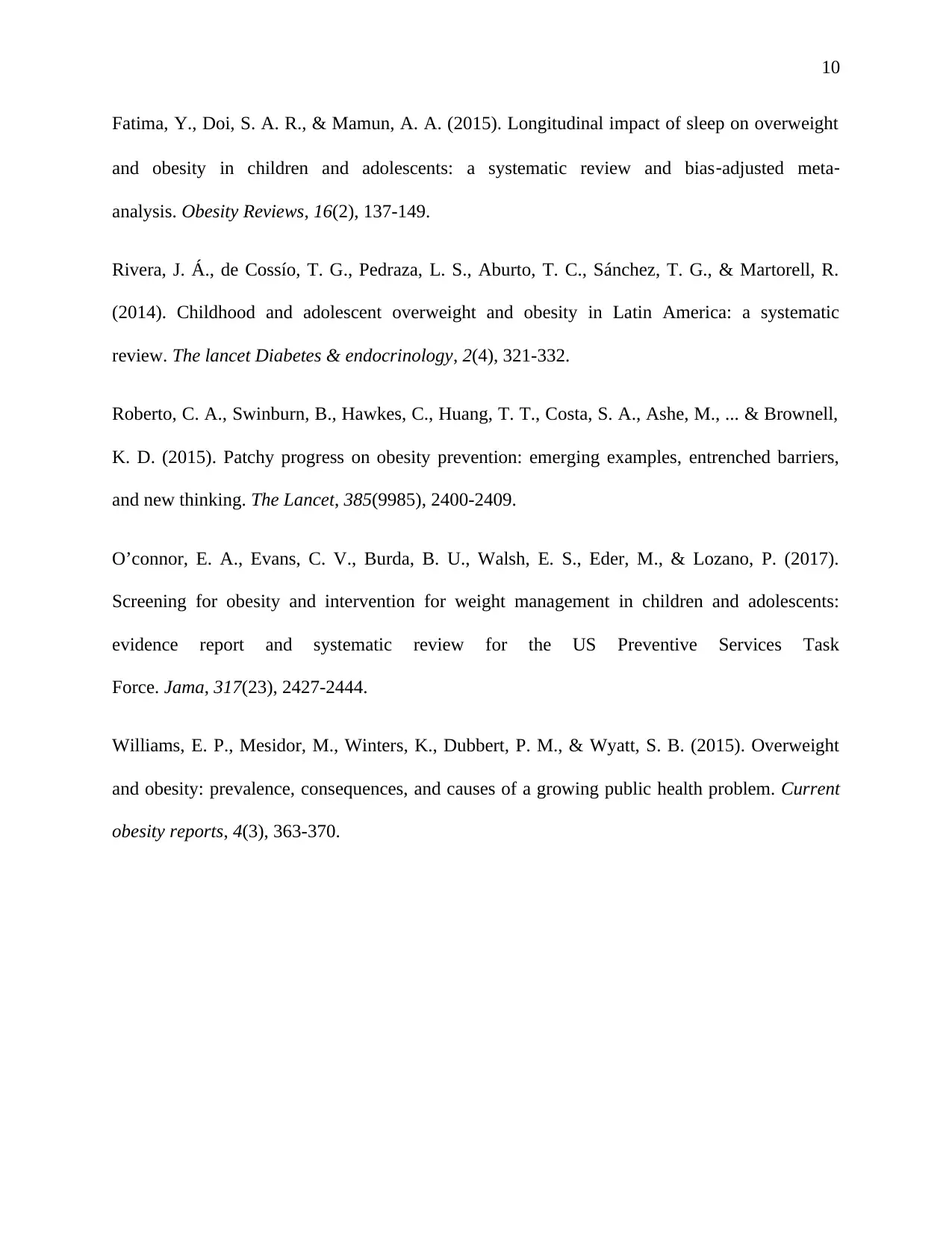
10
Fatima, Y., Doi, S. A. R., & Mamun, A. A. (2015). Longitudinal impact of sleep on overweight
and obesity in children and adolescents: a systematic review and bias‐adjusted meta‐
analysis. Obesity Reviews, 16(2), 137-149.
Rivera, J. Á., de Cossío, T. G., Pedraza, L. S., Aburto, T. C., Sánchez, T. G., & Martorell, R.
(2014). Childhood and adolescent overweight and obesity in Latin America: a systematic
review. The lancet Diabetes & endocrinology, 2(4), 321-332.
Roberto, C. A., Swinburn, B., Hawkes, C., Huang, T. T., Costa, S. A., Ashe, M., ... & Brownell,
K. D. (2015). Patchy progress on obesity prevention: emerging examples, entrenched barriers,
and new thinking. The Lancet, 385(9985), 2400-2409.
O’connor, E. A., Evans, C. V., Burda, B. U., Walsh, E. S., Eder, M., & Lozano, P. (2017).
Screening for obesity and intervention for weight management in children and adolescents:
evidence report and systematic review for the US Preventive Services Task
Force. Jama, 317(23), 2427-2444.
Williams, E. P., Mesidor, M., Winters, K., Dubbert, P. M., & Wyatt, S. B. (2015). Overweight
and obesity: prevalence, consequences, and causes of a growing public health problem. Current
obesity reports, 4(3), 363-370.
Fatima, Y., Doi, S. A. R., & Mamun, A. A. (2015). Longitudinal impact of sleep on overweight
and obesity in children and adolescents: a systematic review and bias‐adjusted meta‐
analysis. Obesity Reviews, 16(2), 137-149.
Rivera, J. Á., de Cossío, T. G., Pedraza, L. S., Aburto, T. C., Sánchez, T. G., & Martorell, R.
(2014). Childhood and adolescent overweight and obesity in Latin America: a systematic
review. The lancet Diabetes & endocrinology, 2(4), 321-332.
Roberto, C. A., Swinburn, B., Hawkes, C., Huang, T. T., Costa, S. A., Ashe, M., ... & Brownell,
K. D. (2015). Patchy progress on obesity prevention: emerging examples, entrenched barriers,
and new thinking. The Lancet, 385(9985), 2400-2409.
O’connor, E. A., Evans, C. V., Burda, B. U., Walsh, E. S., Eder, M., & Lozano, P. (2017).
Screening for obesity and intervention for weight management in children and adolescents:
evidence report and systematic review for the US Preventive Services Task
Force. Jama, 317(23), 2427-2444.
Williams, E. P., Mesidor, M., Winters, K., Dubbert, P. M., & Wyatt, S. B. (2015). Overweight
and obesity: prevalence, consequences, and causes of a growing public health problem. Current
obesity reports, 4(3), 363-370.
1 out of 10
Related Documents
Your All-in-One AI-Powered Toolkit for Academic Success.
+13062052269
info@desklib.com
Available 24*7 on WhatsApp / Email
![[object Object]](/_next/static/media/star-bottom.7253800d.svg)
Unlock your academic potential
© 2024 | Zucol Services PVT LTD | All rights reserved.




